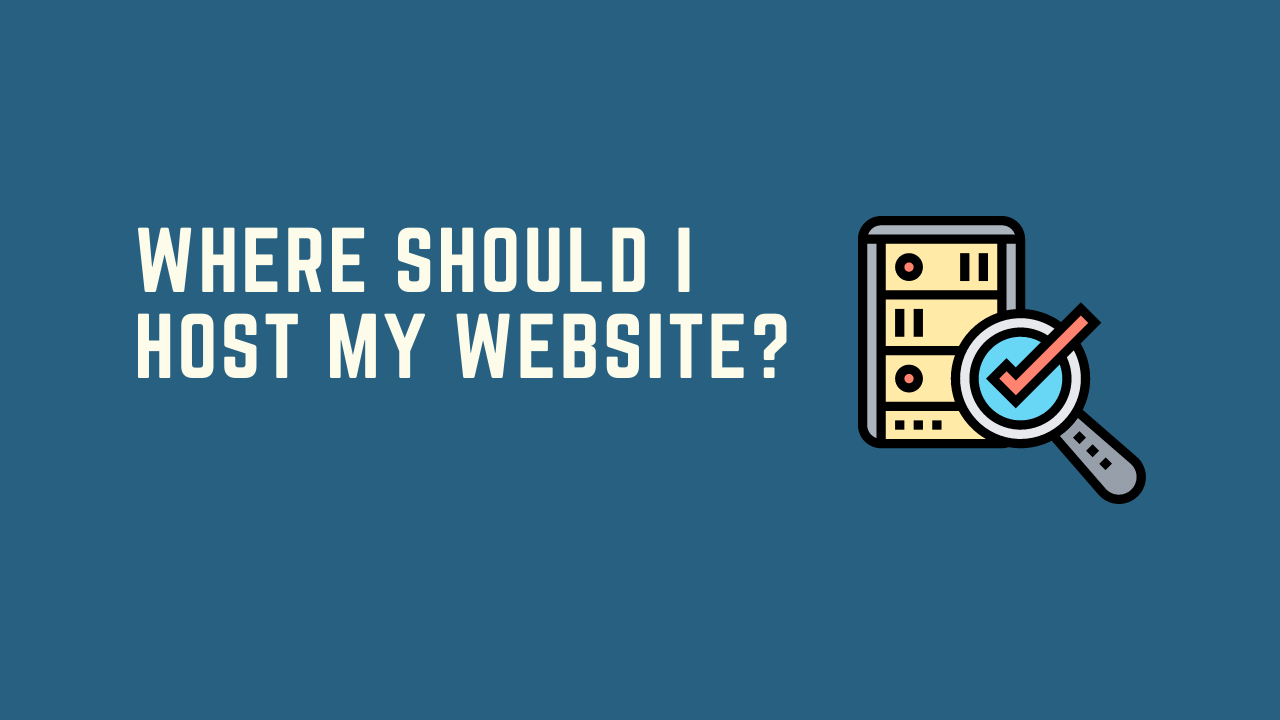"Where should I host my website?" It's every newbie blogger's question.
Before anything else, I would like to make a full disclaimer here. I am not a very technical person when it comes to hosting. But my target audience doesn’t have a website.
Since I am one step away from him (I have built/maintain websites), I can certainly help him based on my current level.
Trying to be “an expert” doesn’t make any sense. While you can become a “semi-expert” over time, I do not believe that you will ever be an expert. Things are always changing and there’s always room for improvement.
Don’t be an expert. Your goal is to help.
In an attempt to really answer the question of where to host a newbie's site, I searched for FREE platforms that my target audience can try while learning the initial stages on how to build a profitable blog.
Most of them have limitations. What can you expect? They are free.
The main limitation of free platforms is you cannot install plugins (separate lesson) unless you pay. To maximize your blogging efforts, you need to install plugins. Otherwise, you are just blogging for fun.
Why Do You Need "Plugins"
The first thing we will do when you build your blog is install a "protection" from potential hackers/spammers.
While some hosting platforms has a built-in function for this, some hosting companies will need you to install this protection separately.
To speed up your site, you need to install a plugin. Again, it is a built-in function for some hosting companies.
To do your SEO easily, plugins are necessary.
To encourage people to share your contents, plugins for social sharing can be installed (like the social sharing buttons you see in my pages).
I design my web pages using the Thrive Architect plugin (for convenience).
I sometimes go back to the classic look of WordPress (using a Classic Editor plugin), because even if I already chose to embrace the Block Editor (separate lesson), there are still functions from the old WordPress classic editor that I need to use, like getting ASA2 codes.
Depending on your WordPress theme, you may need use a plugin for displaying an e-mail invite box.
I used a plugin to switch my pages to posts and vice versa when I made mistakes in the past creating pages instead of posts and vice versa.
I use the "Pretty Link" plugin to manage all my affiliate links in one place.
Some people use a fixed widget plugin to make something stick to the sidebar so people can see the Call-To-Action (CTA) in their face, LOL.
I use a plugin to reduce the sizes and optimize every image I upload in my site.
Etc.
I just cannot imagine how I'd do customizations easily without a plugin. For some, it can be possible - like manually reducing the size of every image before upload. But who has time to do that?
Technical Support
To answer where you should host your website depends on many factors. One of which is technical support.
If you are a newbie, you need a 100% reliable technical support - for no added cost.
You can get discouraged when something happens to your website and you might bounce from forum to forum trying to figure out the solution (if ever you host your site to “free” platforms offering zero to little support).
I myself am not a very technical person and rely 95% on my hosting site’s technical support for the past five years (and counting)!
Should you choose a cheaper hosting platform, expect a "bot" chat box (with FAQ pages) to answer your questions. If not, there's an option to send a ticket which can take hours or days to get solved (depending on the hosting platform).
Premium technical support is normally an upsell. You either pay for a more expensive hosting package to get a premium technical support, or join the free community of your hosting platform to ask questions. If not, just consume the FAQ pages, and hope that they'll help.
Hosting Speed
Hosting speed will depend on many factors, such as the things you put inside your website - large images, videos, heavy but unnecessary plugins (separate lesson), and other things that you actually don’t need.
Most of the time, shared servers tend to be "cramped" - the cheaper your web hosting, the more "shared" it is, therefore, the slower your website will be.
If you cannot see your server, then you'll have limited ways to make your site faster - because no matter how hard you try to optimize your website to load faster, the fact that you are sharing your resources (your server) with other websites that you do not have control of, they can still pull your speed down.
Security
Free websites are vulnerable and easy to hack. Hackers can easily inject a malicious code to your free website and you can say goodbye to your hard work.
Getting a hosting service will allow you to secure your website (either thru built-in website protection or 3rd party WordPress plugin).
If you are using a "shared server," any malicious activity that the server suffers will affect all the websites using the same server.
Scalability
Web hosting involves storing all your web files in a web host. When a person types your domain name, the browser will download your site files from the web host to display them.
There are various types of web hosting services, such as:
1. Shared - the cheapest; you rent a part of a partitioned server along with hundreds of other websites; suited for beginners who want their first website online fast
2. Dedicated - an entire server hosts a website giving you complete control on server environment; requires some technical knowledge for setting up and maintaining the website
3. VPS - still uses a shared server, but also runs a virtualized server
4. Managed - you get hosting from servers that a team of experts manage and optimize for your website
5. Cloud hosting relieves you from renting the space on one physical server. All server hardware is virtual. With cloud hosting, you have unlimited resources to use for fast-growing websites. Your website will have a protection from malfunctioning servers because you can switch to another server if one is under performing.
Cloud hosting offers many outstanding features like:
· flexible pricing, you only pay for what you use
· very scalable, suits a website with up and down traffic
· reliable uptime and performance
If you are just starting out, there's no need to get an expensive hosting.
Just make sure that as your website gains more visits, you are prepared to upgrade from your current limits so your web visitors will not be traumatized if your website takes forever to load.
I'm telling you, they are never coming back to visit you again, LOL.
Be wary of hosting services that offers "unlimited" visits for a cheap price. Unlimited and cheap cannot be in the same sentence, lol. Look for the disclaimer which is most of the time found in smaller fonts.
Most people start in cheap shared servers, then, they migrate to their own servers over time where they don't need to share anymore.
Portability
Use WordPress so you can easily backup and take your website with you wherever you choose to transfer.
Reliability
You need to have a 100% uptime guarantee so your website is always up! Imagine your website being down on the most important days of the year - like the Black Friday Sale when people go crazy buying things online.
You'll lose a lot of money if your website is down. This is specifically applicable for cheap shared servers.
If you own a server, you manage and monitor it. "Scheduled maintenance" can be disabled from your account so there's no downtime at all.
Free Professional Email Addresses
A good freebie you can get from a hosting company is it should allow you to create free professional e-mail addresses.
That means instead of using the generic @gmail.com, etc. e-mail address as your website contact, you should have your own @yourdomainname.com to look more professional - for free.
Own Your Domain Name
One thing that most shared servers offer as a freebie is a domain name registration, usually good for 1 year. With this, the domain is also locked to the hosting service.
If you wish to transfer to another hosting provider, you need to wait for the expiration of your domain lock-in period before you can own your domain - i.e transfer it to an independent domain registrar (like Namecheap).
It is best not to lock your domain with a hosting provider to begin with.
To really help to solve one of my target audience's problem on where to host his first website, read our hosting comparisons:
P.S. REALITY CHECK: Nothing is free when you are starting a business. Even small time online sellers need to shell out a little money to buy and resell something.
If you want to have a profitable business, you need to spend even small amounts when starting out.




Amazing, I’ve gone through so many articles about where should I host my website and this one’s been the best so far! I was impressed with your write-up where should I host my website. I really believe that we should focus on this and will help solve the issues. These are great tips you’ve shared.
Thank you so much for your feedback, Sarah. I’m glad to hear that the article was helpful!
If you are a beginner with no previous experience with websites, a lot of things need to be considered before you build your site, and you have listed and described them perfectly. I am otherwise lucky to have found Wealthy Affiliate, joined, and through the training made the first necessary steps where I set up my website (WordPress) and some plugins. Much of what you list (hosting speed, security, portability, domain registration) is taken care of through this guided process.
I wish you all the best.
Nina
Thank you for sharing your thoughts, Nina. I’m glad to hear that Wealthy Affiliate has been helpful in getting you started with a website and that it aligns with what you’re looking for!
I also hope this post helps other beginners who are researching the best place to host their site.
Cheers,
Pitin
It’s tempting to be lured over to the lowest cost option, but you need to be extra careful about the choice and consider more than just the cost in dollars. A bad host could cost time in site downtime, hours spent with tech support, and slow platforms that can’t handle your website traffic. Thanks for sharing.
I appreciate your insights, Aly! There are many factors at play when considering which plan is best suited for each business. As long as one understands the tradeoffs between price vs features, they should be able to find the right fit for their needs.
Cheers,
Pitin
This sure will clear up questions newbies will have about website hosting.
I just love your reality check note at the end. It’s so true, and the sooner it’s realized the less expectation will be out there. There are people I know who decided to do everything from scratch to avoid paying and now, they have no plugin and no proper advice. They’re sitting with no proper site and it is taking them years. Every business will start off slow and with hiccups but it will eventually get going, and when it does, all the hard work and funds you put into it will pay off.
Thank you for your insights, Janine!
In terms of hosting – yes, there are many options out there but not all will suit every business type. It’s important to find one that meets your needs and budget before starting any work on the site so you can avoid unexpected costs down the line.
Cheers,
Pitin